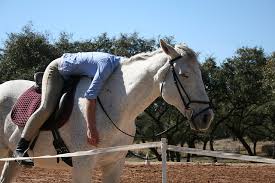The horse starts to drop behind your leg, he is not quite giving his fences enough clearance and his breathing rate increases. The chances are he is fatigued. His ability to continue performing is compromised because a protective mechanism has kicked in to prevent him exercising to a point where he may cause himself actual damage.
As a fight or flight animal, the horse may be willing to go further than a human athlete in terms of combating tiredness. This is because during hard exercise a horse’s adrenalin level is around 10 times higher than our own. Adrenaline can help mask pain and allow a horse to push itself harder than may be beneficial to its welfare. For this reason, it is important that we recognise the signs of fatigue and know how to delay its onset through appropriate riding.
The signs to look out for
➤ A slowing of pace
➤ Decreased responsiveness to the aids
➤ An unwillingness or inability to increase speed or change gait
➤ Loss of motivation
➤ Reduced coordination (for example, stumbling/losing balance/wandering)
➤ Increased frequency of brushing or overreaching fences
➤ Increased head and neck movement
➤ Increased breathing effort
➤ Hitting obstacles.















